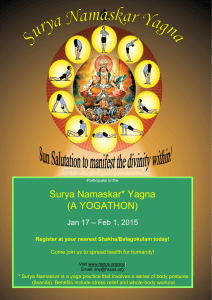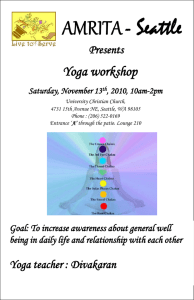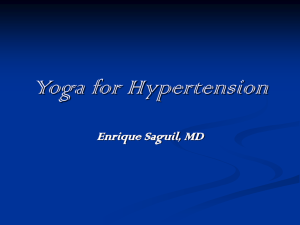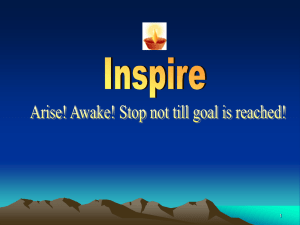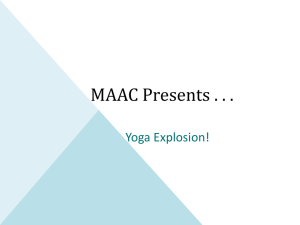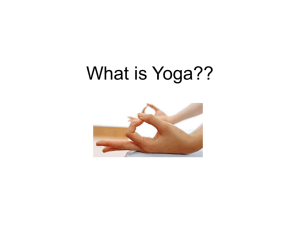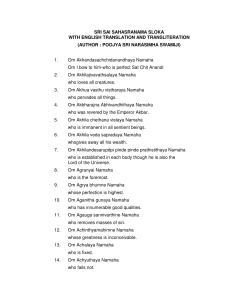Yoga-and-Health1
advertisement
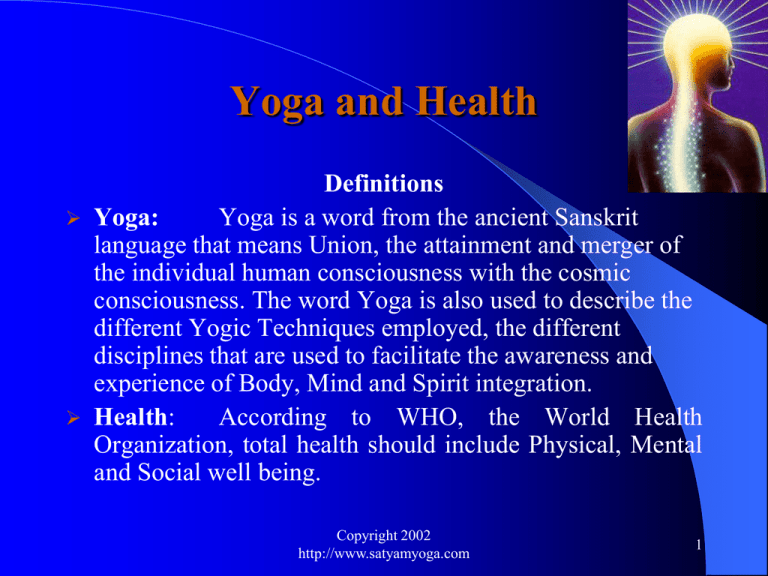
Yoga and Health Definitions Yoga: Yoga is a word from the ancient Sanskrit language that means Union, the attainment and merger of the individual human consciousness with the cosmic consciousness. The word Yoga is also used to describe the different Yogic Techniques employed, the different disciplines that are used to facilitate the awareness and experience of Body, Mind and Spirit integration. Health: According to WHO, the World Health Organization, total health should include Physical, Mental and Social well being. Copyright 2002 http://www.satyamyoga.com 1 Yoga and Health Links Yoga has for thousands of years had a holistic understanding of the Human being, its subtle physiology and the connection between mind and body. The vast philosophies and disciplines of Yoga have remained essentially the same for thousands of years. Currently western science is exploring the benefits of Yoga and its effects on mind and body with keen interest. Scientific research has been expanding at a modest rate for at least the last three decades. Copyright 2002 http://www.satyamyoga.com 2 More Yoga and Health Links Yoga views the Human body as a composite of Mind, Body, Spirit and supplies unique techniques that create a harmony between these increasingly more refined aspects of our total personality. One of the yogic models used to describe, what constitutes the human beings total personality is known as the Pancha Kosha (five sheaths or bodies) theory. The five body theory can be experienced through awakening of the major chakras, Sushumna and Kundalini i.e.) Yoga Copyright 2002 http://www.satyamyoga.com 3 Yogic Model of a Human Being Pancha Kosha From the Deepest most subtle body or sheath to the gross and Superficial body, Yoga views the innermost essence of everyone as: Spirit Body- Anandamaya Kosha (body of Bliss) Psychic Body-Vigyanamaya Kosha (Unconscious mind) Mental Body- Manomaya Kosha (Conscious mind) Energy Body- Pranamaya Kosha ( Bio-Plasmic energy, life force) Physical Body-Annamaya Kosha (Food dependant, gross body) Copyright 2002 http://www.satyamyoga.com 4 Pancha Kosha An analogy once described by Swami Niranjan went like this. Imagine a human being like an onion consisting of five layers. The outer ring or sheath the physical body, the second ring inside the bio energy sheath, the third ring or body the mental body, the fourth ring the psychic body or sheath, and the last ring the innermost essence being the spiritual essence and experience. Yoga views health as essential and an outcome of having found a balance between our total personality and the world around us. This fits the total health model definition described by WHO in my opinion. Copyright 2002 http://www.satyamyoga.com 5 Nadis - Indian Yoga System Meridians - Chinese TCM System According to Yoga when there is a free flow of Prana or Chi (Life force or Subtle energy) within the Nadis or Meridians, which permeate our bodies there, is health. A bit like the bodies ability to maintain a physiological and Psychological homeostatic balance. Yoga uses techniques that help boost, harmonise and refine the flow of Prana or Chi, thereby helping to maintain or enhance health. Copyright 2002 http://www.satyamyoga.com 6 Nadis and Meridians When there is an imbalance or blockage to the flow of consciousness or energy that moves within these channels, then illness and or disease can manifest and impact on our health. As in western medicine health problems can be created in many ways including somatopsychically and psychosomatically. Copyright 2002 http://www.satyamyoga.com 7 Components of a Basic Yoga Class Yoga Postures - Asanas: are postures that stimulate the flow of Prana/ Chi throughout the body , they can include forward bending postures, backward bending postures, sideways bending postures, twisting postures, inverted, balancing and meditational postures. Breathing Techniques – Pranayama :A repertoire of breathing exercises to revitalise the physiological components of respiration (breathing). Techniques to help balance the nervous system and provide the doorway to productive meditation. Copyright 2002 http://www.satyamyoga.com 8 Meditation Meditation: A vast array of techniques exist for every level of aspirant, beginning with deep relaxation (Yoga Nidra) students can then progress to more advanced meditation techniques depending on their needs and experience. Through Meditation you realize how important a balanced mind is through experiencing deeper aspects of your own personality and then you begin to balance your essential needs and desires and develop insight Copyright 2002 http://www.satyamyoga.com 9 Instruction in Yoga A good Yoga class comprises components of all these categories starting with the body (Asanas) then going to the breath (Pranayama) which is the link between the body and mind. After Pranayama you can proceed to the mind with a greater sense of awareness and an enhanced ability to concentrate on your object of meditation. Breath, Mantra, Symbol, Yantra etc. It should be emphasized that Yoga is best learnt from a qualified Yoga teacher and not from a book or video. These resources can supplement Yoga instruction but never replace it. Some techniques may also be contraindicated (not advisable). Ask your teacher and learn from their experience. Copyright 2002 http://www.satyamyoga.com 10 Surya Namaskara A good example of Asanas can be seen in the practice of Surya Namaskara (Salute to the sun). It only involves forward and backward bending but the practice can also include additional elements such as breath synchronisation, mantra repetition, Chakra concentration. This takes the simpler version to a more absorbing sophisticated version. The following pages describe the full practice which is essentially a classical method of preparation, for advanced Yogas such as Kundalini Yoga and Kriya Yoga. Copyright 2002 http://www.satyamyoga.com 11 Position 1 - Pranamasana (Prayer Pose) Breath Chakra Surya mantra Bija mantra Muscles Organs/glands Benefits Spiritual Exhale Anahata Om Mitraya Namaha Om hram postural, from soles of feet to crown of the head cerebellum, thymus establishes balance, concentration ,calmness raising consciousness to higher levels of awareness Position 2 - Hasta Utthanasana (Raised Arm Pose) Breath Chakra Surya mantra Bija mantra Muscles Organs/glands Benefits Spiritual Inhale Vishuddhi Om Ravaye Namaha Om hrim back, shoulders, arms, chest, abdomen kidneys, intestines, lungs, adrenal glands , thyroid / parathyroid, opening emotionally, corrects poor posture Invoking the grace and power of higher forces Position 3 - Padahastasana (Hand to Feet Pose) Breath Chakra Surya mantra Bija mantra Muscles Organs/glands Benefits Spiritual Exhale Swadhisthana Om Suryaya Namaha Om hroom hamstrings, buttocks, back, neck, shoulders GIT, kidneys, thyroid improves digestion, circulation & respiration surrender to the powerful forces of gravity Position 4 - Ashwa Sanchalanasana (Equestrian Pose) Breath Chakra Surya mantra Bija mantra Muscles Organs Benefits Spiritual inhale Ajna Om Bhanave Namaha Om hraim legs, buttocks, abdomen, thorax and neck cerebellum sense of balance, centre of gravity removes darkness from delusions Position 5 - Parvatasana (Mountain Pose) Breath Chakra Surya mantra Bija mantra Muscles Organs Benefits Spiritual exhale Vishuddhi Om Khagaya Namaha Om hraum legs, buttocks, abdomen, thorax and neck cerebellum, tones spinal nerves sense of balance, centre of gravity,improves circulation Salute to the one by whom time is measured Position 6 - Ashtanga Namaskara (Salute With 8 Points) Breath Chakra Surya mantra Bija mantra Muscles Organs Benefits Spiritual retain breath (out) Manipura Om Pushne Namaha Om hraha legs, buttocks, abdomen, thorax and neck, shoulders, forearms recharges solar plexus, stimulates metabolism, Adrenal glands, Kidneys strengthening and nourishing the body Salute to the giver of strenght Position 7 - Bhujangasana (Cobra Pose) Breath Chakra Surya mantra Bija mantra Muscles Organs Benefits Spiritual inhale Swadhisthana Om Hiranya Garbhaya Namaha Om hram stretches abdomen ms,anterior neck ms strengthens posterior back ms kidney and liver, digestive system Good for asthma, constipation praying to the awakening of creativity Position 8 - Parvatasana (Mountain Pose) Breath Chakra Surya mantra Bija mantra Muscles Organs Benefits Spiritual exhale Vishuddhi Om Marichaye Namaha Om hrim legs, buttocks, abdomen, back and neck thyroid stretches spinal nerves, circulation salutations to the lord of the dawn Position 9 - Ashwa Sanchalanasana (Equestrian Pose) Breath Chakra Surya mantra Bija mantra Muscles Organs Benefits Spiritual inhale Ajna Om Adityaya Namaha Om hroom stretches hip flexor ms, strengthens quads loosens tight hips massages abdominal organs, nervous system nervous system, pineal gland salutations to he who illumines Position 10 - Padahastasana (Hand to Feet Pose) Breath Exhale Chakra Swadhisthana Surya mantra Om Savitre Namaha Bija mantra Om hraim Muscles stretches hamstrings, buttocks, back, Posterior neck, shoulders ms Organs/glands GIT, kidneys, thyroid Benefits improves digestion, circulation & respiration Spiritual salutations to the benevolent mother forces of gravity Position 11 - Hasta Utthanasana (Raised Arm Pose) Breath Chakra Surya mantra Bija mantra Muscles Organs/glands Benefits Spiritual Inhale Vishuddhi Om Arkaya Namaha Om hraum back, shoulders, arms, chest, abdomen kidneys, intestines, lungs,adrenal glands , thyroid/parathyroid, opening emotionally, corrects poor posture salutations to he who is fit to be praised power of higher forces Position 12 - Pranamasana (Prayer Pose) Breath Chakra Surya mantra Bija mantra Muscles Organs/glands Benefits Spiritual Exhale Anahata Om Bhaskaraya Namaha Om hraha postural, from soles of feet to crown of the head cerebellum, thymus sense of balance, centre of gravity, concentration salutations to he who leads to enlightenment Reference Saraswati, Swami Satyananda, 1973 Surya Namaskara – A Technique of Solar Vitalization Bihar School of Yoga Munger, Bihar, India Saraswati, Swami Satyananda, 1993 Asana Pranayama Mudra Bandha, 8th Ed. Bihar School of Yoga Munger, Bihar, India Website: Yogavision.net Copyright 2002 http://www.satyamyoga.com 24
